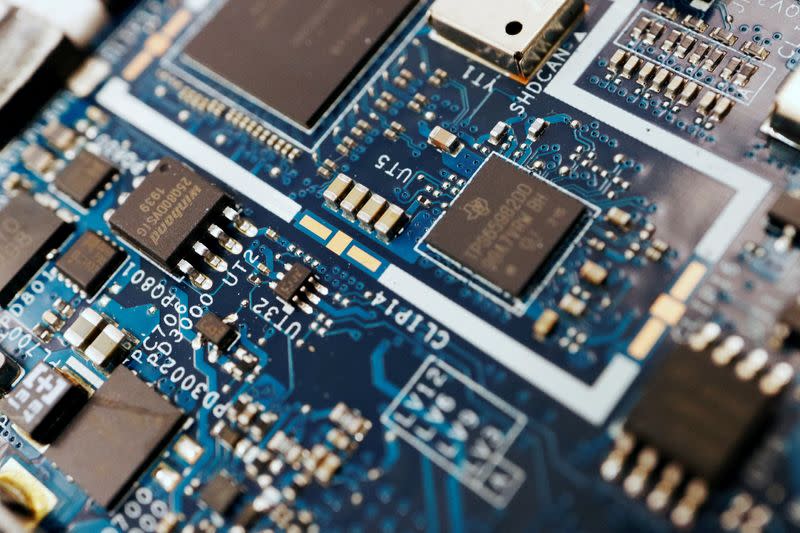Japan-backed fund to buy chip materials maker JSR for $6.4 billion

By Sam Nussey and Tim Kelly
TOKYO (Reuters) -Japan stepped up efforts to bolster its chip industry on Monday, with a government-backed fund agreeing to buy semiconductor materials maker JSR Corp for about 909.3 billion yen ($6.4 billion).
The move by Japan Investment Corp (JIC), overseen by the powerful trade ministry, is the latest in a series of increasingly muscular government steps to try to regain Japan's lead in advanced chip production and maintain its edge as a maker of materials and tools used in their manufacture.
JIC plans to launch a tender offer in late December offering 4,350 yen per share, a 35% premium to Friday's closing price, to take JSR private. Mizuho Bank and the government-backed Development Bank of Japan (DBJ) will provide financing.
JSR shares rose by 22%, their daily limit, ahead of the official announcement. The news raised expectations of sector consolidation, driving shares in peer Tokyo Ohka Kogyo 10% higher, while Sumitomo Chemical and Shin-Etsu Chemical each rose 2%.
"Capabilities here are superb, but there are a lot of us and all of us are spending money redundantly, so we feel the opportunities for efficiency gains are significant," JSR CEO Eric Johnson told a news conference.
Johnson, a rare foreign-born head of a Japanese company, said he aimed to relist the company in five to seven years.
The deal comes amid deepening tensions between the United States and China as President Joe Biden's administration builds domestic chip manufacturing capacity. Japan and the Netherlands have joined the U.S. in restricting exports of chipmaking tools to China.
JSR is a top supplier of photoresists, which are light-sensitive chemicals used to etch patterns on wafers.
"Japan has a monopoly, with China and others yet to develop this technology," said Kazuhiro Sugiyama, consulting director at research firm Omdia.
HEAVY INVESTMENT
JSR approached JIC about potential backing, an industry ministry official said.
JSR needs to invest heavily in production capacity and the development of materials for advanced chip manufacturing, said the official, who declined to be named because they are not permitted to speak with media.
"We felt a strong sense of crisis from JSR management that the Japanese chip materials industry would eventually lose to overseas rivals," Shogo Ikeuchi, the chief executive of JIC's private equity fund, told Reuters in an interview. "Their thinking was perfectly aligned with our fund's purpose, which is to promote industry consolidation."
While Japan has a long and mixed record of intervening to save floundering industrial players, the move to buy a profitable company that has already undergone restructuring risks criticism for potential overreach.
JIC said last November it had expanded the size of its buyout fund by 4.5 times to 900 billion yen.
"JIC is starting here. It would surprise me quite a bit if that is where they stopped," Travis Lundy of Quiddity Advisors wrote in a note on Smartkarma.
JSR, which was set up in 1957 as a government-backed producer of synthetic rubber, reported a 20% jump in sales to 408.9 billion yen in the year ended March, while operating profit declined 33% to 29.4 billion yen.
JSR and Shin-Etsu have market shares of 39% and 37%, respectively, in the ArF photoresist market, according to Nomura Securities, with JSR's clients including Samsung Electronics, Taiwan Semiconductor Manufacturing Co and Micron Technology.
In the advanced extreme ultraviolet (EUV) photoresist market, Tokyo Ohka Kogyo is adding share from top clients in South Korea and Taiwan, Nomura said.
Shares in JSR had already gained 25% year-to-date at Friday's market close. Activist investor ValueAct Capital, which said it supports the deal, is a major shareholder and has an executive on the board.
($1 = 143.1200 yen)
(Reporting by Sam Nussey, Tim Kelly, Miho Uranaka, Makiko Yamazaki and Noriyuki Hirata; Editing by Muralikumar Anantharaman and Mark Potter)


